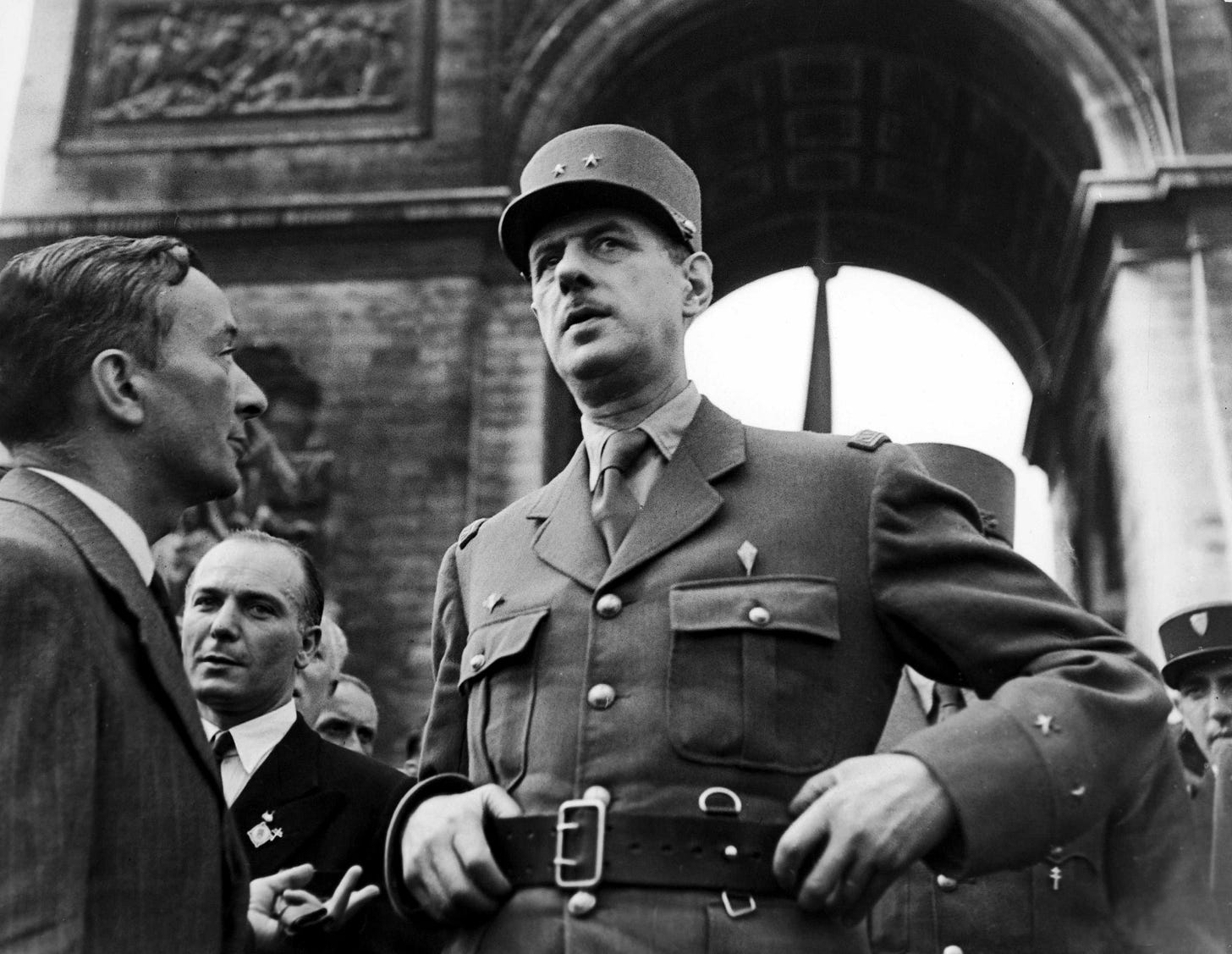The Reactionary International
Retired members of the French military are threatening a coup. Prominent Trumpists are sympathetic.
(Photo by Serge DE SAZO/Gamma-Rapho via Getty Images)
Sixty years ago this month, between April 21 and April 26, 1961, a group of French military officers led the Algiers putsch, a failed coup d'état designed to prevent the decolonization policy of President Charles de Gaulle, then in the process of extricating France from Algeria.
On April 21, 2021, a date obviously picked to echo the events of 1961, a group retired members of the French military released an open letter warning that France was on the verge of civil war and that military should prepare to seize power. The letter was signed by Christian Piquemal, former head of the French foreign Legion, along with 20 retired generals, 80 officers, and roughly 1,000 service members of lower rank.
The letter warned that “our fatherland” is “crumbling-apart through a certain kind of anti-racism, which has an explicit goal: to sow malaise on our soil, up to and including hate between communities.” The letter warned that, “if nothing is done, heedlessness will continue to spread its poison throughout society, inexorably. In the end, there will be an explosion, and our comrades in active military service will be forced to step in and undertake the perilous mission of protecting our civilizational values and the lives of our fellow citizens.”
National Front leader Marine Le Pen caused an uproar by expressing sympathy for the letter. Art Goldhammer, an astute watcher of the French scene, suggests Le Pen’s embrace of these new putschists will undermine her tireless attempt to rebrand herself as a mainstream politician and revive fears of her extremism.
The letter has been translated and reprinted in the United States by The American Mind, a publication of the Claremont Institute, perhaps the leading Trumpist think tank. During the Trump presidency, members of the Claremont Institute often joined the administration or influenced its policies, as in the 1776 Project, a nationalist response the White House prepared to The 1619 Project. As Sean Illing of Vox observed, “If Trumpism had an intellectual home, it would be the Claremont Institute.”
In the introduction to the letter, the editors of The American Mind argue that in France “a true coup or uprising—an event quite unlike the shambolic ordeal in Washington on January 6th—might erupt at the slightest provocation.” They also insist that the warning in the letter applies to the United States as well as France.
The translation and reprinting of the letter is a reminder that the Trumpist right has deep ties its European counterparts. There is a kind of informal Reactionary International, which shares ideas, tactics and rhetoric. It’s no accident that in both the United States and France the members of the Reactionary International are thinking about launching a coup.
It’s not widely understood how old the Reactionary International is. It formed in the early Cold War, with the recruitment of onetime Nazis and fascist collaborators into the American-led crusade against communism.
The May 6, 1961 issue of National Review contained a remarkable paean to the men who tried to overthrow the French government. About Maurice Challe, the leader of the putsch, National Review offered this tribute: he “has been, for France, the highest living embodiment of the ideal of the soldier: absolute in courage, skill, dedication, loyalty, self-sacrifice.” The coup was described in these terms: “All normal and legal means having been exhausted, these soldiers … placed their duty to their country, their civilization, and their God above their duty to their commander in chief. By sheer interposition of their united will, they made a desperate and supreme attempt to block the enemy’s advance, and thus save France and Europe, and the Free World from a mortal danger.”
Conversely, Maurice Papon, who as head of the Paris police oversaw the 1961 and 1962 massacres of anti-imperialist activists that left more than 100 people dead, was an admirer of National Review editor James Burnham. As historians Jim House and Neil MacMaster argued in their book Paris 1961, “Papon, drawing on Burnham, put forward a proto-fascist model of a corporate state.”
Writing in National Review in 1985, Thomas Molnar criticized a history of the French military for being insufficiently empathetic towards General Raoul Salan, one of the leaders of the 1961 putsch. Molnar wrote that the historian Alistair Horne, “makes laudable efforts to see General Salan’s role in the Algerian coup attempt as similar to de Gaulle’s role in rebelling against the armistice signed by Petain. Yet, he hardly supplies the background that would enable the American reader , for example, to understand that to this day
half of the French regard Salan’s rebellion as legitimate, but would question de Gaulle’s. It was de Gaulle who tore up the unwritten law of army solidarity.” Elsewhere in this review, Molnar claims that “De Gaulle himself revolted against Petain’s lawful government.” In other words, fascist collaboration was legitimate and the 1961 coup plotters were more justified than de Gaulle’s decision to join the Western allies in the war against Nazism.
The Reactionary International, as should be clear, is a proto-fascist movement. For the sake of democracy, it’s urgent that people of this orientation be rooted out of the military in France, the United States, and wherever else they may be found.
In late 2020 and early 2021, I took comfort in the fact that Trump seemed to have limited support in the officer class of the American military. This led me to think that for all Trump’s bluster about a coup, he wouldn’t have the crucial military support he needed. I was right to the extent that the January 6 insurrection was, as The American MindT writes, a “shambolic” farce. But it looks like the Trumpists are thinking about how a future coup might succeed. The are starting to realize that they need to cultivate a mutinous cadre in the officer class. That’s a development pregnant with dangers.




